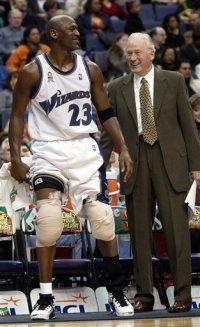Great basketball minds are hard to come by. Guys like Greg Popovich and Phil Jackson immediately spring to mind, but recently we lost one of the best. On Jan. 18, the basketball world lost the great Johnny Bach. Bach had a long, fascinating career, both as a player and as a coach, and encountered some of the best basketball players of all time along the way.
In 1942, Bach enrolled as a freshman at Fordham and joined the basketball team. He bounced around between a few schools before landing back at Fordham for the 1947-1948 season, during which he became the team MVP. Following his collegiate career, Bach was drafted by the Boston Celtics, signing for $5,000. He only ended up playing in 24 professional games before deciding to get into other aspects of the game he loved.
Bach became one of the youngest head coaches in the country in 1950 when his alma mater, Fordham, decided to go in a different direction than Frank Adams. Bach immediately got Fordham back to its winning ways. Within his first five seasons, the Rams had two appearances in the NCAA Tournament. Bach continued his success until 1968. During the rest of his tenure, the Rams reached an incredible five NIT tournaments. To the modern basketball fan, the NIT isn’t that important, but at the time it was just as good, if not better than the NCAA Tournament. The seven banners garnered by Bach’s teams still hang in Rose Hill Gym to this day as a reminder of when Fordham was still great.
After the 1968 season, Bach coached at Penn State. When the 1972 Olympics rolled around, he was asked by the legendary Henry Iba to be an assistant. That team, led by Doug Collins, is remembered for the controversial ending in the gold medal game and for never accepting their silvers. After a ten year career in Happy Valley, Bach made the leap to the NBA, and coached the Golden State Warriors for a number of years. His biggest success came as an assistant under Collins, and later, the aforementioned basketball genius Phil Jackson with the Chicago Bulls. Bach entered the league during one of the golden ages of basketball, which included the culmination of the Lakers-Celtics rivalry, the “Bad Boy” Pistons and the first Bulls three-peat. Bach continued to coach for the next decade, including a brief stint with the Wizards from 2001-2003. That team, which was coached by Collins, was led by Michael Jordan, who came out of retirement for the second time.
In 2006, Bach retired to Illinois, where he lived out the rest of his life. He was never shy about sharing the stories from his historic career.
Johnny Bach’s legacy is one of greatness. He may be gone, but his accomplishments remain visible in the rafters of Rose Hill Gym, the United Center in Chicago and in whichever box contains those silver medals. Upon hearing of the passing of his friend, Phil Jackson shared this: “Tonight I’ll think of him and that spirit he embodied, especially his motto after a late night on the road. ‘What? You can’t be tired, you can sleep in the grave.’ Sleep well, Johnny.”





